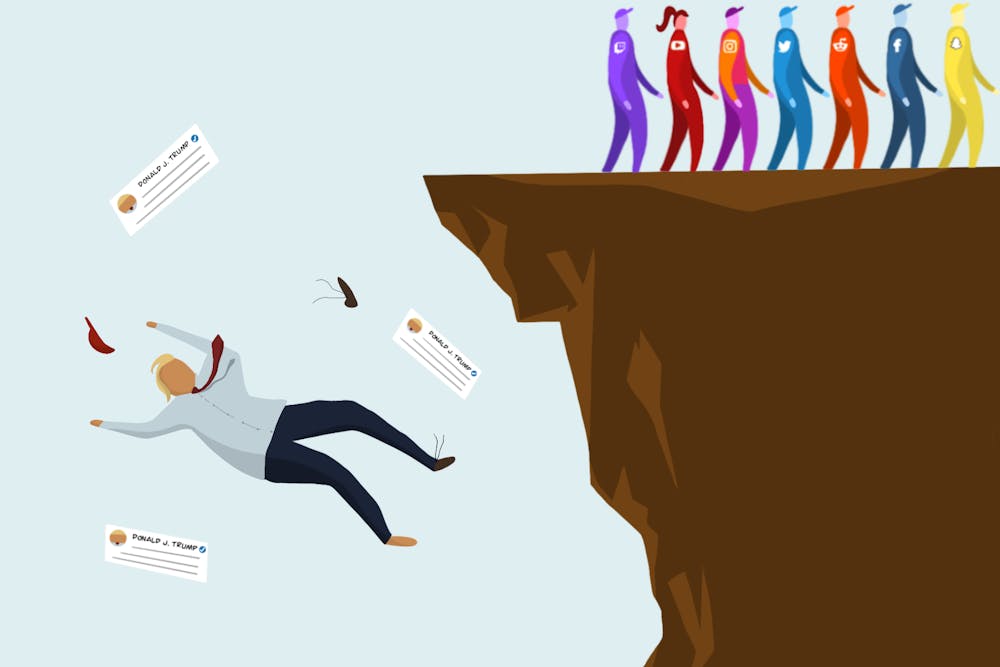Since social media companies are some of our most important means of communication, they have an obligation to keep their users safe from speech that affects both the online and offline worlds.
That’s what platforms ranging from Twitter to Shopify did earlier this month, when not only former President Donald Trump but also users who propagated hateful speech that could incite violence, were banned. The app and website Parler, which is popular with conservatives seeking a platform with more lax rules, was removed from the Google Play Store, Apple App Store and its web platform, Amazon Web Services, for its lack of moderation.
As anyone could expect, this caused a bit of an uproar. From sitting members of the U.S. Congress to YouTube channel hosts, these moves were deemed violations of freedom of speech. The other main complaint was that big tech companies were clearly taking a political side — this being the most obvious Orwellian move by leftists that run said big tech companies.
Firstly, this is not a violation of the First Amendment, which codifies freedom of speech. The First Amendment prevents the government from interfering with free speech, not private enterprises. If this argument must be extended to social media, as it is often treated as a public commons for communication nowadays, then direct your attention to Supreme Court case Brandenburg v. Ohio (1969), which stated the modern definition of what presents a “clear and present danger.”
Brandenburg won the case (don’t root for him, though; he was a Ku Klux Klan leader) since Ohio’s laws against being in groups or teaching groups about criminal activity was overly broad. However, this ruling opinion stated that speech could be limited if it is 1. "directed at inciting or producing imminent lawless action" and 2. "likely to incite or produce such action."
Many actions others would deem "censored" would not be protected by the First Amendment anyway, including condoning the actions of those at the U.S. Capitol, live tweeting the location of U.S. representatives during the riots, as Rep. Boebert did, or any actual planning of the storming of the Capitol.
Secondly, there is a broad examination of the 1,800 most followed “opinion leaders” on Twitter by the Washington Post. The writers focused on political accounts, from people that mainly dealt with politics in their professions, and looked at how frequently they posted and how much others interacted with those posts. Surprisingly, the most “popular” political accounts were mostly moderate, and, in actuality, conservative opinion leaders had more interaction on their posts. Conservative voices are not silenced on Twitter, and leftist ones are not elevated.
Lastly is the argument that all of these bans, permanent or not, are reminiscent of George Orwell’s "1984." This classic novel, published in 1949, contains criticism of the government as a surveillance state. However, as some might forget, this is not all it criticizes.
The Party in "1984" is totalitarian and fascist. This novel is also a severe critique of fascism from an author who saw the effects of such a horrible ideology in post-World War II Europe, as Orwell himself was English. Orwell was an ardent democratic-socialist who said that “every line of serious work that I have written since 1963 has been written, directly or indirectly against totalitarianism and for democratic socialism.”
Using his name in defense of people who stormed the Capitol, people who agree with those who stormed the Capitol (or at least seemed to agree with it until that opinion faced public backlash), terrorists, white supremacists, fascists and perpetrators of insane conspiracies such as QAnon would make Orwell roll in his grave.
People don't necessarily have a right to never see hateful content that incites violence, but platforms have a right to, well, not give it a platform. If that content happens to come from conservative accounts, the president or even an entire app, then so be it.

